Soil Moisture retrieval from multi-temporal SAR data
advertisement
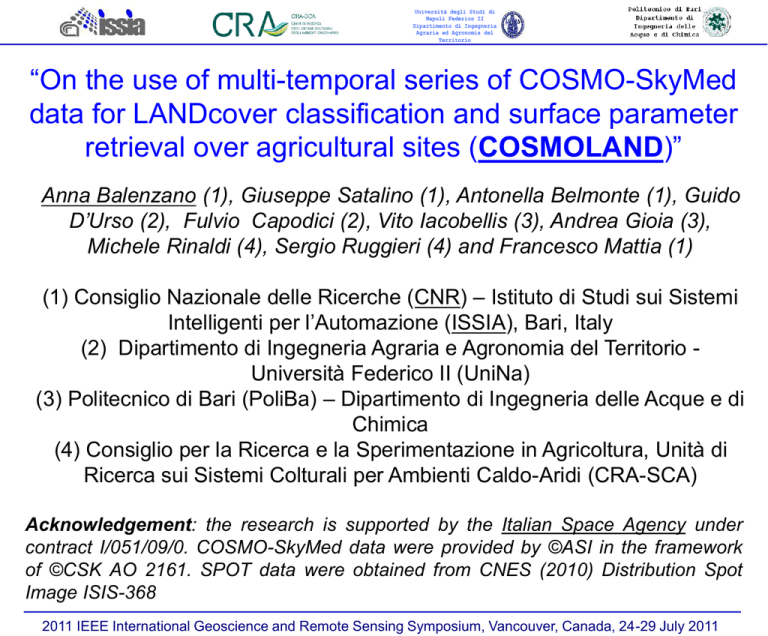
Università degli Studi di Napoli Federico II Dipartimento di Ingegneria Agraria ed Agronomia del Territorio “On the use of multi-temporal series of COSMO-SkyMed data for LANDcover classification and surface parameter retrieval over agricultural sites (COSMOLAND)” Anna Balenzano (1), Giuseppe Satalino (1), Antonella Belmonte (1), Guido D’Urso (2), Fulvio Capodici (2), Vito Iacobellis (3), Andrea Gioia (3), Michele Rinaldi (4), Sergio Ruggieri (4) and Francesco Mattia (1) (1) Consiglio Nazionale delle Ricerche (CNR) – Istituto di Studi sui Sistemi Intelligenti per l’Automazione (ISSIA), Bari, Italy (2) Dipartimento di Ingegneria Agraria e Agronomia del Territorio Università Federico II (UniNa) (3) Politecnico di Bari (PoliBa) – Dipartimento di Ingegneria delle Acque e di Chimica (4) Consiglio per la Ricerca e la Sperimentazione in Agricoltura, Unità di Ricerca sui Sistemi Colturali per Ambienti Caldo-Aridi (CRA-SCA) Acknowledgement: the research is supported by the Italian Space Agency under contract I/051/09/0. COSMO-SkyMed data were provided by ©ASI in the framework of ©CSK AO 2161. SPOT data were obtained from CNES (2010) Distribution Spot Image ISIS-368 2011 IEEE International Geoscience and Remote Sensing Symposium, Vancouver, Canada, 24-29 July 2011 Università degli Studi di Napoli Federico II Dipartimento di Ingegneria Agraria ed Agronomia del Territorio Objective to present the activities carried out during the first year of COSMOLAND project on land cover classification and the retrieval of surface parameters (i.e. Leaf Area Index and soil moisture content) using temporal series of COSMO-SkyMed data Outline Application context COSMO SkyMed & ground data collected over an agricultural site, Foggia (Italy), during the COSMOLAND campaign in 2010 Sensitivity of multi-temporal X band SAR data to crops: classification algorithm Sensitivity of multi-temporal X band SAR data to vegetation and soil moisture content Leaf Area Index retrieval algorithm Soil moisture content retrieval algorithm (SMOSAR algorithm) Summary and future work 2011 IEEE International Geoscience and Remote Sensing Symposium, Vancouver, Canada, 24-29 July 2011 Università degli Studi di Napoli Federico II Dipartimento di Ingegneria Agraria ed Agronomia del Territorio Application context The project intends to contribute to the COSMO-SkyMed objectives in agriculture and hydrology application domains, combining SAR-derived information and hydrological/crop growth models to improve land and water resource managment. A limitation of land process models is the need for numerous input parameters, which are seldom available at the appropriate temporal scale. This lack of information often leads to erroneous model predictions. Crucial information for the land process model performances: Land use maps (at medium/low resolution, e.g. monthly) Leaf area index maps(at high temporal resolution, e.g. weekly) Soil moisture content maps (at high/very high temporal resolution during alert periods, e.g. daily or hourly) COSMO-SkyMed constellation characterized by a short revisiting time gives a chance to monitor the surface parameters at high temporal resolution and to demonstrate the use of EO data for improving land process model forecasts 2011 IEEE International Geoscience and Remote Sensing Symposium, Vancouver, Canada, 24-29 July 2011 Università degli Studi di Napoli Federico II Dipartimento di Ingegneria Agraria ed Agronomia del Territorio 2010 COSMOLAND campaign over Foggia (Italy) Puglia Product derived from SPOT images (2010) Foggia site (Apulia region) Classified image from multitemporal SPOT Series of 1C-Geocoded Ellipsoid data (Maximum Corrected COSMO Sky-Med StripMap likelihood algorithm PingPong products on SPOT4 DT ID Date Mode swath Mean Polarization incidence 04/07/2010, angle [°] 25/07/2010). D1 03/04/10 StripMap PP02 26 HH/HV 24 D2 27/04/10 StripMap PP02 26 HH/HV Overall accuracy 24 in test: 95% for D3 21/05/10 StripMap PP02 26 HH/HV the test fields 8 D4 29/05/10 StripMap PP02 26 HH/HV Main crops of(% theofarea cultivated of approx. area): 700km2 Wheat (42%) (48%) Tomatao ( 8%) Tomato 7%) Olives ( 4%) ( 5%) In situ measurements from March to September: soil moisture with gravimetric method fresh & dry biomass, plant density and height, Leaf Area Index, yield Sugar beet (4%) (3%) Vineyard (8%) (4%) D5 08/07/10 40 StripMap PP02 26 HH/HV D6 24/07/10 16 StripMap PP02 26 HH/HV D7 01/08/10 8 StripMap PP02 26 HH/HV D8 09/08/10 8 StripMap PP02 26 HH/HV Limitation: lack of planned dense temporal series of COSMO SkyMed data (average revisiting time DT=18 days) 2011 IEEE International Geoscience and Remote Sensing Symposium, Vancouver, Canada, 24-29 July 2011 Università degli Studi di Napoli Federico II Dipartimento di Ingegneria Agraria ed Agronomia del Territorio Sensitivity of multi-temporal X band data to crops RGB compositions of the COSMO HH images (left) and of HV images (right) over Foggia. R: 20100403, G:20100427, B:20100521 HV pol. HH pol. Product derived from original COSMO-SkyMed products ©ASI- Agenzia Spaziale Italiana (2010) Temporal X-band backscatter signature of crops is significantly different and provides useful information for classification. 2011 IEEE International Geoscience and Remote Sensing Symposium, Vancouver, Canada, 24-29 July 2011 Università degli Studi di Napoli Federico II Dipartimento di Ingegneria Agraria ed Agronomia del Territorio Accuracy of the land use classification using multitemporal COSMO data over Foggia in 2010 Based on the Maximum Likelihood algorithm Overall classification accuracy of multitemporal, single/multipolarization COSMO images vs the number of the SAR images Overall classification accuracy of selected (close to the time of full development of crops) multi-temporal, single/multi-polarization COSMO images vs the number of the SAR images Product derived from original COSMO-SkyMed products ©ASI- Agenzia Spaziale Italiana (2010) Land use image from COSMO pingpong Strip Map HH+HV (acquisition dates 03/04/10, 21/05/10, 08/07/10, 09/08/10 ) Temporal information during the growing season is important to improve the crop classification accuracy. 2011 IEEE International Geoscience and Remote Sensing Symposium, Vancouver, Canada, 24-29 July 2011 Università degli Studi di Napoli Federico II Dipartimento di Ingegneria Agraria ed Agronomia del Territorio Sensitivity of X band backscatter to soil moisture (mv) and vegetation of wheat fields data set collected during the ESA AgriSAR 2006 campaign, DEMMIN site (Germany): Temporal behaviour of E-SAR s0 at X-band (HH polarization and 33° incidence angle) and mv and 1/fb of wheat field (N=11) dense temporal series of X band E-SAR data from April to August well-documented ground data X band soil moisture fresh biomass Correlation coefficients 0.55 (< 7.8%) -0.77 (<0.6%) The radar signal is strongly affected by the canopy, which attenuates the backscatter and reduces the sensitivity to the soil moisture. X band SAR data are suited to retrieve vegetation parameters (fb&LAI) of wheat fields and soil moisture content over low vegetated or bare soils. 2011 IEEE International Geoscience and Remote Sensing Symposium, Vancouver, Canada, 24-29 July 2011 Università degli Studi di Napoli Federico II Dipartimento di Ingegneria Agraria ed Agronomia del Territorio Empirical approach for Leaf Area Index retrieval Experimental relationship between LAI and backscatter of wheat field (derived by the ESA AgriSAR’06 campaign data set) Example of LAI map obtained applying the experimental relashionship to 2010 COSMO data over Foggia LAI [m2/m2] 5 4 3 2 y = -0.28x + 0.32 R2 = 0.69 1 29/05/2010 0 -20 -15 -10 Backscatter [dB] -5 2 6 LAI [m2/m2 ] The rmse is 1.1 m2/m2 for LAI derived by COSMO SkyMed data. The rmse is 0.8 or 1.0 m2/m2 using LAI derived by SPOT or MERIS data acquired over Foggia from 2006 to 2008 2011 IEEE International Geoscience and Remote Sensing Symposium, Vancouver, Canada, 24-29 July 2011 Università degli Studi di Napoli Federico II Dipartimento di Ingegneria Agraria ed Agronomia del Territorio Soil moisture retrieval based on s0 temporal changes using dense time series of SAR data The rational of this approach is that temporal changes of soil roughness and vegetation take place at longer temporal scales than soil moisture changes dominant scattering mechanism: SPM & SSA & PO s 0 s 0s soil scattering soil attenuated by the canopy s 0s pp , r F , s, l , ACF 2 s 0 2s 0s Soil roughness and vegetation from DoY → DoY+1 constant (e.g. 1 week revisiting time) s s 0 doy 1 0 doy pp , pp , 2 r doy 1 r 2 HH , r cos ( r 1) sin r 2 2 doy The alpha approximation is appealing as it simplifies the backscatter ratio between two subsequent and closed SAR observations into a quantity that depends only on soil moisture changes ( constant) 2011 IEEE International Geoscience and Remote Sensing Symposium, Vancouver, Canada, 24-29 July 2011 Università degli Studi di Napoli Federico II Dipartimento di Ingegneria Agraria ed Agronomia del Territorio Quantitative retrieval of mv N SAR acquisitions N-1 linear equations in N unknown pp coefficients s s 0 doy ( j ) S ji 1 i N 1 j i 1 0 doy ( i ) , r pp doy ( j ) SS ji pp , r doy ( i ) 0 1 k N 1 k Under determined linear system infinite number of solutions Solution found through Least Square minimization subject to the linear constraints: min pp pp , r max pp Details in Balenzano et al., IEEE JSTARS 2011 2011 IEEE International Geoscience and Remote Sensing Symposium, Vancouver, Canada, 24-29 July 2011 Università degli Studi di Napoli Federico II Dipartimento di Ingegneria Agraria ed Agronomia del Territorio Soil moisture maps over bare fields of Foggia site using COSMO data at HH pol. in 2010 Doy 205 Doy 213 Rain event on DoY 212 A quantitative assessment of the soil moisture retrieval accuracy comparing retrieved and hydrologically modeled mv maps is in progress 2011 IEEE International Geoscience and Remote Sensing Symposium, Vancouver, Canada, 24-29 July 2011 Università degli Studi di Napoli Federico II Dipartimento di Ingegneria Agraria ed Agronomia del Territorio European Space Agency project "GMES Sentinel-1 Soil Moisture Algorithm Development“ poster section in area K on Wed. Texture maps SMOSAR (Soil Moisture retrieval from multi-temporal SAR data) algorithm based on the alpha approximation Land cover maps NDVI maps CrossPol SAR images Co-Pol SAR images Inc. angles images Time series of N-SAR images Ancillary data On-line processor N-masked Co-Pol images Masking block Retrieving block Time series of N-mv maps Fast Delivered mv maps N-FD mv maps of the same DoY Off-line processor Averaging procedure 1-P mv map & 1-error map of the same DoY Precision mv - error maps SMOSAR transforms dense time series of N SAR images into N-mv maps over agricultural areas with vegetation cover not dominated by volume scattering 2011 IEEE International Geoscience and Remote Sensing Symposium, Vancouver, Canada, 24-29 July 2011 Università degli Studi di Napoli Federico II Dipartimento di Ingegneria Agraria ed Agronomia del Territorio Summary classification, LAI and soil moisture retrieval algorithms, based on maximum likelihood, empirical approach and temporal backscatter changes, respectively, have been illustrated and applied to temporal series of X band SAR data the experimental data set consists of 8 COSMO SkyMed images, at HH/HV polarization, acquired in 2010 over an agricultural site in Italy. Results show that: classification accuracy improves as a function of the number of the SAR images. Accuracy of 87% when 4 COSMO images on dates close to the full development of crops are used. potential to retrieve LAI of wheat fields and soil moisture content of bare or low vegetated soils using multi-temporal SAR data at X band Future work II year of the COSMOLAND project: validation of the retrieval/classification algorithms and assessment of the improvement due to the coupling of the land process models with SAR-derived information 2011 IEEE International Geoscience and Remote Sensing Symposium, Vancouver, Canada, 24-29 July 2011
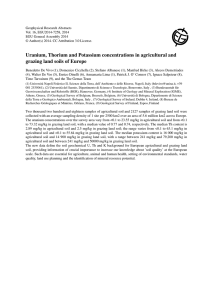
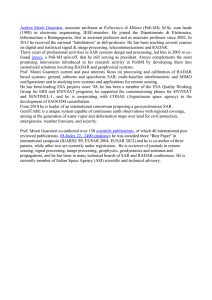
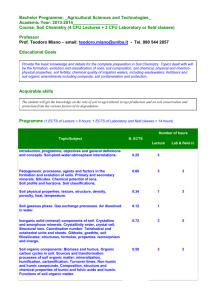
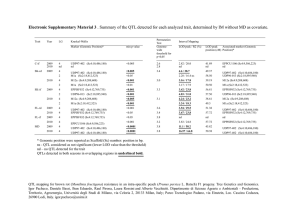
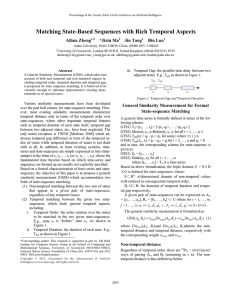
![7, ]3l In partial - * iuui 'Ryt:](http://s2.studylib.net/store/data/011330421_1-eb1c461fe3c03f2e3f68da968a82ed44-300x300.png)